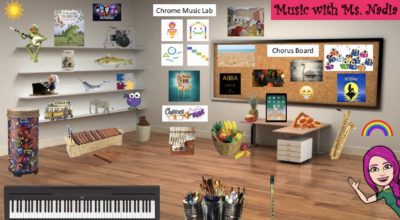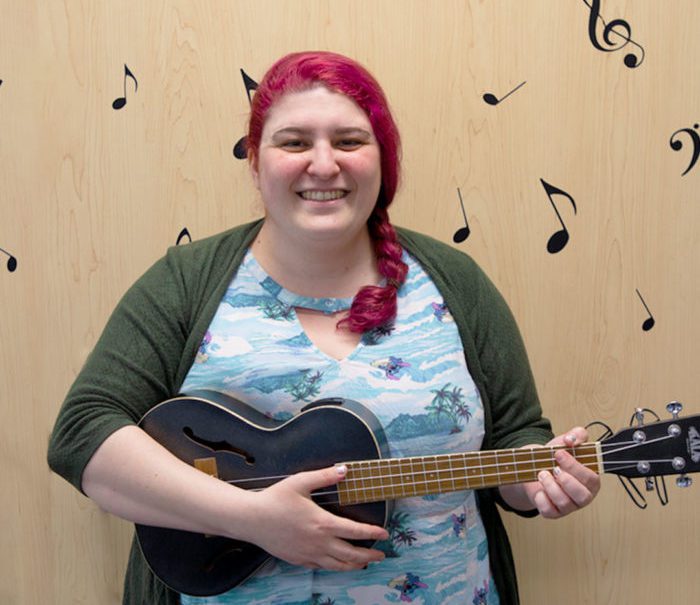While music teacher Nadia Castagna, BS MMEd, has been with The New England Center for Children for almost two years, nothing in that time could have prepared her for the challenges of remote learning. However, despite some obstacles, Castagna is yet another example of an educator using creativity to work with students effectively through this abnormal time. What makes her work unique, though, is a consistent commitment to innovating her lessons while striving to attain her goal of making music accessible to all.
To provide this accessibility, Castagna has relied heavily on the use of technology in communicating her lessons. She generally has Zoom meetings with her classes at the same time that they would have been meeting in person if students were at school and, in addition to going through the lessons live, she also records them to make them available to parents and teachers at their convenience. Castagna also makes sure that her lessons do not require any additional physical materials. So, while her lessons in school might have included instruments, she instead relies on students to sing or dance along while she helps them with keeping beats, rhythm, and tonality.
“I don’t require instruments, or any sort of materials in my virtual lessons so that anybody can participate,” says Castagna. “The most important thing for me when designing my lessons is making sure that every student, teacher, and family feels supported and is comfortable with the content. I don’t want anybody to feel left out.”

Castagna’s interactive classroom allows students to click on the different pictures around the room to access resources.
To further work towards her goal of total accessibility, Castagna has also recently introduced a virtual, “interactive classroom” to her students. The “classroom” is a PowerPoint presentation that includes several different music resources strewn throughout it. In addition to links to lessons and albums that her students enjoy listening to, other NECC team members also have provided videos of themselves performing different music that students can watch. By utilizing so many different resources in the PowerPoint, Castagna provides students, teachers, and families flexibility in how they can continue to participate in the music program.
It is not always easy, as Castagna recounts there are often “difficult days” when planning, performing, and recording her lessons, but by relying on technology and ingenuity, she has continued to foster a music-driven community at NECC. She wants every student at NECC to have music, whether it is playing an instrument, singing, or dancing, as a leisure activity, and she loves watching her students grow. Her students are what come first and what has driven her remote learning lessons. Says Castagna, “Some people only dream of meeting their favorite musicians…I teach mine.”
About The New England Center for Children
The New England Center for Children® (NECC®) is an award-winning autism education center and research institute. Our community of teachers, researchers, and clinicians have transformed the lives of thousands of children with autism worldwide through education, research, and technology. The Center provides comprehensive services to maximize independence: home-based, day, and residential programs, partner classrooms in public school systems, consulting services, the ACE® ABA Software System (www.acenecc.org), teacher professional development, and research on educational best practices.
NECC is committed to staff professional development, partnering with local colleges to provide on-site graduate training and degrees at little to no cost to the NECC teacher. The result is a growing pool of exceptional teachers trained in best-in-class methodologies, whether they continue their careers at NECC or move on to public schools or private agencies. The New England Center for Children is based in Southborough, MA, and operates a center in Abu Dhabi, UAE. Learn more at www.necc.org.

